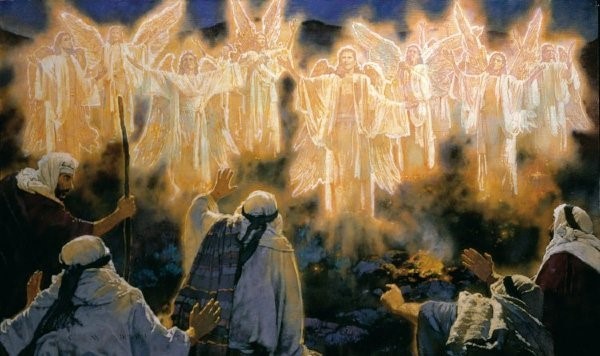
Tennessee Williams’ most famous play, A Streetcar Named Desire, debuted on Broadway in 1947.
A journalist who was able to find his way backstage asked one of the performers how he would summarize the play.
The actor replied, “It’s about a guy who comes to take a woman to an insane asylum.”
The fellow who talked to the journalist just happened to be the bit player who came on stage during the final scene to help escort Blanche DuBois, the leading lady, to a local hospital. He was confusing his brief and inconsequential role with the Big Story.
Something like that happens every Christmas. People are strongly tempted to confuse their own stories – their hopes, their needs, and their anxieties of the present moment – with the Real Story of God coming into the world as a human being twenty centuries ago.
How can we see the bigger picture?
Let’s begin by agreeing on something: Christmas is not your birthday. That should change the way we draw closer to December 25.
Every year we have the chance to renew our acquaintance with the deeper meaning of what happened at Bethlehem. We can reflect on the biblical accounts. And we can ponder the lyrics of the more theologically grounded carols. That would certainly include Hark! The Herald Angels Sing – one of the enduring gifts to the world from John and Charles Wesley.
The Wesley brothers laid the spiritual foundations for the Methodist Church. John was the theologian and preacher. Charles was the musician and songwriter.
Charles is credited with more than 6,000 original songs. Among them is this joy-filled Christmas composition, written in 1739, that he called Hark! How All the Welkin Rings. The obscure word “welkin” means “the vault of heaven.”
Fourteen years later, the English preacher George Whitefield admitted that while he loved the song, he was less enamored with “welkin.” He renamed it, to the relief of every succeeding generation, Hark! The Herald Angels Sing. The tune was crafted by Felix Mendelssohn, one of history’s greatest classical composers.
Wesley’s text springs from the second chapter of Luke, where shepherds tending sheep near Bethlehem are confronted by a “heavenly host.”
A heavenly host is an angelic army equipped for spiritual combat. It’s no surprise that the shepherds were shaking in their sandals. But this host of angels brought the good news of the Messiah’s birth.
Wesley writes in his third stanza, “Mild he lays his glory by.” Jesus didn’t come to earth as a typical monarch.
A few decades ago, when Queen Elizabeth II made a brief visit to the United States, she came prepared.
Philip Yancey points out that the Queen brought along 4,000 pounds of luggage. That included two outfits for every occasion and appropriate attire to attend a funeral, if that should be necessary.
She toted 40 pints of plasma in case of medical emergency, along with a couple of white kid leather toilet seat covers. Her entourage included her own hairdresser, two valets, numerous bodyguards, and a host of other attendants. The cost of her visit exceeded twenty million dollars.
But hey, that’s how royalty travels – unless you’re the King of the universe.
Jesus arrived on earth without so much as a carry-on bag. There was no smoke, no fire, no pomp, and no circumstance. Jesus’ arrival can be described with a word that is rarely attributed to earthly kings and queens. That word is humility.
As far as we know, only the shepherds got the briefest glimpse of God’s glory:
Hark! The herald angels sing “Glory to the newborn King!
Peace on earth and mercy mild, God and sinners reconciled”
Joyful, all ye nations rise, join the triumph of the skies
With the angelic host proclaim: “Christ is born in Bethlehem”
Hark! The herald angels sing “Glory to the newborn King!”
Christ by highest heav’n adored, Christ the everlasting Lord!
Late in time behold Him come, offspring of a Virgin’s womb
Veiled in flesh the Godhead see, hail the incarnate Deity
Pleased as man with man to dwell: Jesus, our Emmanuel
Hark! The herald angels sing “Glory to the newborn King!”
Hail the heav’n-born Prince of Peace! Hail the Son of Righteousness!
Light and life to all He brings ris’n with healing in His wings
Mild He lays His glory by, born that man no more may die
Born to raise the sons of earth, born to give them second birth
Hark! The herald angels sing “Glory to the newborn King!”
Turn up the sound on Pentatonix’s exuberant contemporary version of one of the most upbeat of all the traditional carols.
Here’s the ultimate wonder of Christmas: Jesus is the central character of God’s redemptive story. To use a modern turn of phrase, he is the star of the show.
Yet he arrives on the stage looking very much like a bit player – a helpless infant born to a peasant girl in a dusty village.
What, then, is the meaning of Christmas?
It’s to grasp that our own stories, as brief and humble as they are, have eternal significance because they’re part of his Story.
